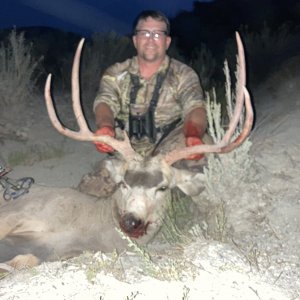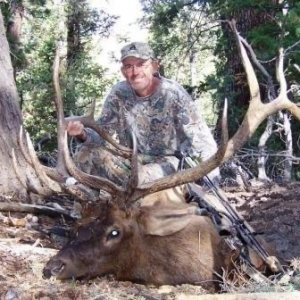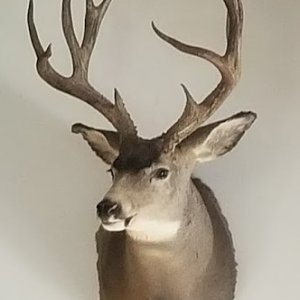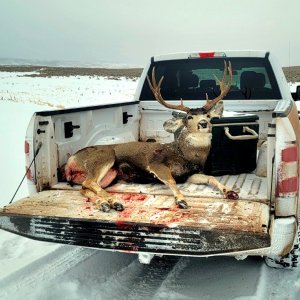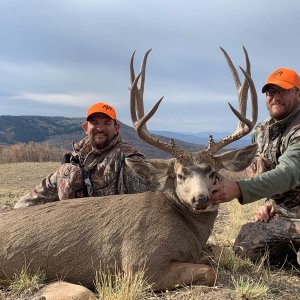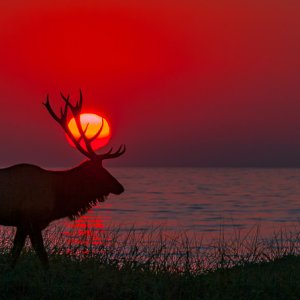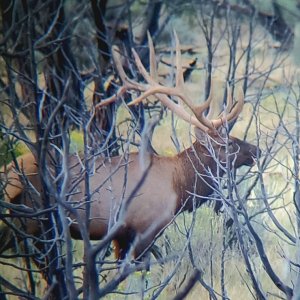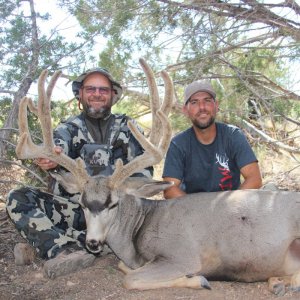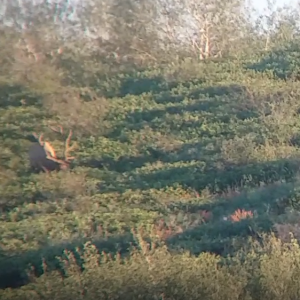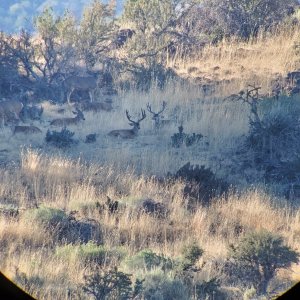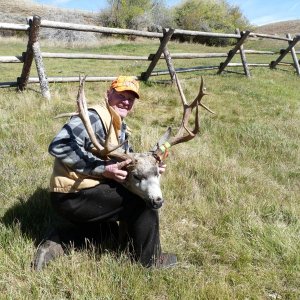NeMont
Long Time Member
- Messages
- 12,632
Interesting Article
RURAL SAN JUAN COUNTY, Utah ? From his home nestled beneath an elm tree in rural San Juan County, and from an easel on which he creates caricatures of everyone from Rush Limbaugh to the owner of Back of Beyond Books in Moab, Jim Stiles says he hopelessly clings to the past every time he self-publishes another issue of the Canyon Country Zephyr.
Simply put, Stiles is a passionate cartoonist, lover of all things wild, and keen observer of southern Utah culture who has just compiled his cultural insight into a book to be published at the end of March called ?Brave New West: Morphing Moab at the Speed of Greed.?
Originally from Louisville, Ky., Stiles moved to southern Utah in the mid-1970s and worked as a seasonal ranger at Arches National Park until 1986. When he quit the National Park Service, he began drawing spoof cartoons in Moab for a satirical publication called ?The Stinking Desert Gazette,? the ?Mad Magazine? of the desert.
Today, Stiles is the owner, publisher, editor, illustrator and feisty brain behind the Zephyr ? distributed regularly all over Grand Junction ? which has been ?clinging hopelessly to the past since 1989.?
That's about when, after the Moab Town Council futilely considered stimulating the Grand County, Utah, economy with a toxic waste incinerator, Stiles consulted his friend, author Edward Abbey about starting an alternative newspaper in Moab.
Impressed with how many of Moab?s conservative residents and the latter-day Moab liberals successfully fought the incinerator proposal together, Stiles wanted his new newspaper to delve into local political and environmental issues more thoroughly than the weekly Moab Times-Independent.
Abbey, as many southern Utah desert rats know, wrote a book called ?Desert Solitaire,? a polemical memoir of his years working as a ranger at what is now Arches National Park. Critical of development in national parks and those who would rather drive to a natural wonder than walk there on their own two feet, Abbey soon became famous ? or infamous, depending on your perspective ? for his vociferous contribution to environmentalism, including one of his characters? sincere hope that a ?pre-cision? earthquake would destroy the Glen Canyon Dam in his novel ?The Monkey Wrench Gang.?
Abbey, who is sometimes credited with planting the seeds of the so-called radical environmental movement with his influence on the founding of the group Earth First!, ?longed for a simpler America,? Stiles said. ?I was so mesmerized by that book (?Desert Solitaire?) and Abbey.?
Abbey was ?incredibly supportive? of Stiles? newspaper idea and submitted an essay for the first issue of the Zephyr.
That issue ? with Abbey?s essay ? came off the press on March 14, 1989, the day Abbey died.
Abbey?s spirit lives on in the Zephyr, a newspaper for which Stiles illustrates all the advertisements, often doing caricatures of advertisers and subjects of stories.
Stiles said it's Abbey?s vision of an uncommercialized Canyon Country that informs the vision of the past to which the Zephyr clings every other month: A past bereft of commercial canyoneering outfitters who, he says, commodify beauty in nearby national parks. A past absent of the environmentalists who, he says, sell wilderness to tourists and legislators as an integral part of an ?amenities economy? rather than treasure wilderness for its own value.
A rappel over a cliff and the rush of discovery have now become more of the stuff outfitters peddle to adventure-seeking tourists, both extensions of Americans? ever-increasing materialism.
?It just seems as if the quality of our lives keeps diminishing while the quantity in our lives keeps increasing,? Stiles said. ?People don't seem to realize having more stuff in our lives isn't making anybody happy.?
Several years ago, Stiles said his view of politics and environmentalism in the West changed.
He found himself a stranger in the town he had lived in for nearly three decades. So he picked up and moved to rural San Juan County where quiet permeates the landscape just as it did in Moab decades ago.
?I first came to Moab when I was this young environmentalist carrying ?Desert Solitaire? around in my pocket,? he said. ?Everything seemed black and white to me: If you were a rancher or a miner, (or) you drove a seismic truck, you were one of the bad guys. If you were for wilderness, (and) wore Vibram-soled boots, you were a good guy.?
But, he said, the longer he lived in the rural West, he realized the lines between the good guys and the bad guys aren't so clearly drawn. People generally have more in common than they would often like to admit, he said.
?Environmentalists were talking about trying to shut down mining and public lands ranching, and I didn't have a problem with that,? he said. ?We were naïve enough to think that if you shut down ranching, all the public lands would be left alone and you didn't have to worry about anything. The reality was that while ranchers used public lands to run their cattle, they also had ranches that weren't just going to sit there and be idle if they couldn't use public lands to survive.?
Ranches started turning into massive development projects, replete with condos and other amenities, he said.
Environmentalists started parroting the ?amenities economy? ? that is, condos on the edge of wilderness ? as the economic salvation of public lands and the environment without acknowledging the effect that new development might have on the very lands they were trying to save, he said.
?When I started talking about these issues, I started running into a brick wall with most of my friends that were environmentalists,? Stiles said.
That frustration led to his new book, ?Brave New West,? and to his new home, he said.
?I think what's happening in Moab is sort of reflecting what's happening in American culture where everything has a dollar value,? he said. ?There is nothing that isn't sacred that can't be commodified and sold.?
The culture and environmentalists have lost control of what's important, he said.
?The idea now that the environmental community tries to sell wilderness as an economic tool as something that would bring more money to your pocket almost seems like a crime to me,? he said. ?It would be like the civil rights movement suggesting the white drugstore owner should let blacks sit at the counter to make more money, not because it was immoral to turn them away.?
Those furthering the amenities economy have capitalized on the extreme sports aspect of wilderness, ignoring the possibility that just being in nature is a reward in and of itself, and ignoring one of the Wilderness Act's basic tenants describing wilderness as a place of great solitude, he said.
Guidebook writers and those leading adventure trips into national parks have taken the mystery out of wilderness, he said.
?Everything is already laid out for you,? Stiles said. ?That's another aspect of Abbey?s prose and belief, the idea that the world should be a mystery,? that the Zephyr tries to embody.
?People are so tight with their time and so worried about wasting their precious free time they have, they somehow think that if they go out on a hike and not have the experience of an arch or a petroglyph or a rappel, they would somehow be a failure,? he said. ?I think that's kind of a pity.?
It's unfortunate, he said, that people oftentimes have to pay a guide $150 to take them on a trip one mile from the highway rather than going out and finding adventure for themselves.
Stiles said that though the Zephyr fiercely advocates for the preservation of wild country and appreciates a past from which Moab has strayed, some in the area who often say they are ideologically opposed to environmentalism of nearly any stripe have told him they appreciate the Zephyr?s message.
?They saw that I hadn't just painted a broad stroke,? he said.
Stiles hopes that may of his readers will appreciate ?Brave New West,? which he spent nearly two years writing.
At first, Stiles said, he didn't know if he had enough to say to write a book. But as the issues changed and Moab changed, he felt he had to put his feelings down in one location, even though he's addressed many of them in the Zephyr over the years.
?I was using the Zephyr as a sounding board for some of the ideas that are in this book,? he said.
There will be plenty of opportunity to judge for yourself when ?Brave New West? hits bookstore shelves.
RURAL SAN JUAN COUNTY, Utah ? From his home nestled beneath an elm tree in rural San Juan County, and from an easel on which he creates caricatures of everyone from Rush Limbaugh to the owner of Back of Beyond Books in Moab, Jim Stiles says he hopelessly clings to the past every time he self-publishes another issue of the Canyon Country Zephyr.
Simply put, Stiles is a passionate cartoonist, lover of all things wild, and keen observer of southern Utah culture who has just compiled his cultural insight into a book to be published at the end of March called ?Brave New West: Morphing Moab at the Speed of Greed.?
Originally from Louisville, Ky., Stiles moved to southern Utah in the mid-1970s and worked as a seasonal ranger at Arches National Park until 1986. When he quit the National Park Service, he began drawing spoof cartoons in Moab for a satirical publication called ?The Stinking Desert Gazette,? the ?Mad Magazine? of the desert.
Today, Stiles is the owner, publisher, editor, illustrator and feisty brain behind the Zephyr ? distributed regularly all over Grand Junction ? which has been ?clinging hopelessly to the past since 1989.?
That's about when, after the Moab Town Council futilely considered stimulating the Grand County, Utah, economy with a toxic waste incinerator, Stiles consulted his friend, author Edward Abbey about starting an alternative newspaper in Moab.
Impressed with how many of Moab?s conservative residents and the latter-day Moab liberals successfully fought the incinerator proposal together, Stiles wanted his new newspaper to delve into local political and environmental issues more thoroughly than the weekly Moab Times-Independent.
Abbey, as many southern Utah desert rats know, wrote a book called ?Desert Solitaire,? a polemical memoir of his years working as a ranger at what is now Arches National Park. Critical of development in national parks and those who would rather drive to a natural wonder than walk there on their own two feet, Abbey soon became famous ? or infamous, depending on your perspective ? for his vociferous contribution to environmentalism, including one of his characters? sincere hope that a ?pre-cision? earthquake would destroy the Glen Canyon Dam in his novel ?The Monkey Wrench Gang.?
Abbey, who is sometimes credited with planting the seeds of the so-called radical environmental movement with his influence on the founding of the group Earth First!, ?longed for a simpler America,? Stiles said. ?I was so mesmerized by that book (?Desert Solitaire?) and Abbey.?
Abbey was ?incredibly supportive? of Stiles? newspaper idea and submitted an essay for the first issue of the Zephyr.
That issue ? with Abbey?s essay ? came off the press on March 14, 1989, the day Abbey died.
Abbey?s spirit lives on in the Zephyr, a newspaper for which Stiles illustrates all the advertisements, often doing caricatures of advertisers and subjects of stories.
Stiles said it's Abbey?s vision of an uncommercialized Canyon Country that informs the vision of the past to which the Zephyr clings every other month: A past bereft of commercial canyoneering outfitters who, he says, commodify beauty in nearby national parks. A past absent of the environmentalists who, he says, sell wilderness to tourists and legislators as an integral part of an ?amenities economy? rather than treasure wilderness for its own value.
A rappel over a cliff and the rush of discovery have now become more of the stuff outfitters peddle to adventure-seeking tourists, both extensions of Americans? ever-increasing materialism.
?It just seems as if the quality of our lives keeps diminishing while the quantity in our lives keeps increasing,? Stiles said. ?People don't seem to realize having more stuff in our lives isn't making anybody happy.?
Several years ago, Stiles said his view of politics and environmentalism in the West changed.
He found himself a stranger in the town he had lived in for nearly three decades. So he picked up and moved to rural San Juan County where quiet permeates the landscape just as it did in Moab decades ago.
?I first came to Moab when I was this young environmentalist carrying ?Desert Solitaire? around in my pocket,? he said. ?Everything seemed black and white to me: If you were a rancher or a miner, (or) you drove a seismic truck, you were one of the bad guys. If you were for wilderness, (and) wore Vibram-soled boots, you were a good guy.?
But, he said, the longer he lived in the rural West, he realized the lines between the good guys and the bad guys aren't so clearly drawn. People generally have more in common than they would often like to admit, he said.
?Environmentalists were talking about trying to shut down mining and public lands ranching, and I didn't have a problem with that,? he said. ?We were naïve enough to think that if you shut down ranching, all the public lands would be left alone and you didn't have to worry about anything. The reality was that while ranchers used public lands to run their cattle, they also had ranches that weren't just going to sit there and be idle if they couldn't use public lands to survive.?
Ranches started turning into massive development projects, replete with condos and other amenities, he said.
Environmentalists started parroting the ?amenities economy? ? that is, condos on the edge of wilderness ? as the economic salvation of public lands and the environment without acknowledging the effect that new development might have on the very lands they were trying to save, he said.
?When I started talking about these issues, I started running into a brick wall with most of my friends that were environmentalists,? Stiles said.
That frustration led to his new book, ?Brave New West,? and to his new home, he said.
?I think what's happening in Moab is sort of reflecting what's happening in American culture where everything has a dollar value,? he said. ?There is nothing that isn't sacred that can't be commodified and sold.?
The culture and environmentalists have lost control of what's important, he said.
?The idea now that the environmental community tries to sell wilderness as an economic tool as something that would bring more money to your pocket almost seems like a crime to me,? he said. ?It would be like the civil rights movement suggesting the white drugstore owner should let blacks sit at the counter to make more money, not because it was immoral to turn them away.?
Those furthering the amenities economy have capitalized on the extreme sports aspect of wilderness, ignoring the possibility that just being in nature is a reward in and of itself, and ignoring one of the Wilderness Act's basic tenants describing wilderness as a place of great solitude, he said.
Guidebook writers and those leading adventure trips into national parks have taken the mystery out of wilderness, he said.
?Everything is already laid out for you,? Stiles said. ?That's another aspect of Abbey?s prose and belief, the idea that the world should be a mystery,? that the Zephyr tries to embody.
?People are so tight with their time and so worried about wasting their precious free time they have, they somehow think that if they go out on a hike and not have the experience of an arch or a petroglyph or a rappel, they would somehow be a failure,? he said. ?I think that's kind of a pity.?
It's unfortunate, he said, that people oftentimes have to pay a guide $150 to take them on a trip one mile from the highway rather than going out and finding adventure for themselves.
Stiles said that though the Zephyr fiercely advocates for the preservation of wild country and appreciates a past from which Moab has strayed, some in the area who often say they are ideologically opposed to environmentalism of nearly any stripe have told him they appreciate the Zephyr?s message.
?They saw that I hadn't just painted a broad stroke,? he said.
Stiles hopes that may of his readers will appreciate ?Brave New West,? which he spent nearly two years writing.
At first, Stiles said, he didn't know if he had enough to say to write a book. But as the issues changed and Moab changed, he felt he had to put his feelings down in one location, even though he's addressed many of them in the Zephyr over the years.
?I was using the Zephyr as a sounding board for some of the ideas that are in this book,? he said.
There will be plenty of opportunity to judge for yourself when ?Brave New West? hits bookstore shelves.

